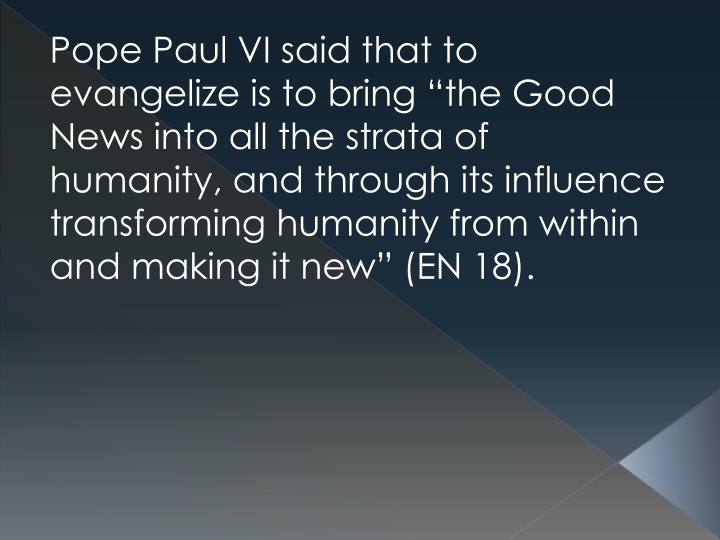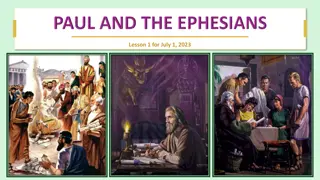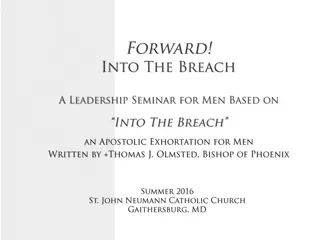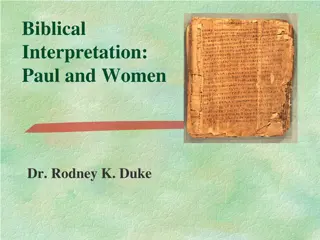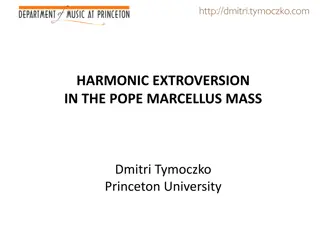Reflections on Evangelization and Transformation by Pope Paul VI
Pope Paul VI emphasized evangelizing to transform humanity from within and bring about a civilization of love, rooted in God's grace. The new evangelization involves a fervent commitment to spreading the Good News in innovative ways, with Jesus Christ as the ultimate answer to life's questions. Through Sacred Scripture, liturgical presence, and encounters with the marginalized, believers are called to embody Christ's love and compassion.
Download Presentation

Please find below an Image/Link to download the presentation.
The content on the website is provided AS IS for your information and personal use only. It may not be sold, licensed, or shared on other websites without obtaining consent from the author.If you encounter any issues during the download, it is possible that the publisher has removed the file from their server.
You are allowed to download the files provided on this website for personal or commercial use, subject to the condition that they are used lawfully. All files are the property of their respective owners.
The content on the website is provided AS IS for your information and personal use only. It may not be sold, licensed, or shared on other websites without obtaining consent from the author.
E N D
Presentation Transcript
Pope Paul VI said that to evangelize is to bring the Good News into all the strata of humanity, and through its influence transforming humanity from within and making it new (EN 18).
Gods grace also enables Christians to work for the transformation of the world, in order to bring about a new evangelization, which my Predecessor Paul VI appropriately called the civilization of love (EA 10).
This new evangelization is a commitment not to a re- evangelization but to a new evangelization new in ardor, methods, and expression (EA 6).
Jesus Christ isthe definitive answer to the question of the meaning of life, and to those fundamental questions which still trouble so many men and women on the American continent (EA 10).
Sacred Scripture read in light of Tradition, the Fathers and the Magisterium, and more deeply understood through meditation and prayer Reading these sacred texts and listening to Jesus attentively as did the multitudes of the mount of the Beatitudes, or on the shore of the Lake of Tiberias as he preached from the boat, produces authentic fruits of conversion of heart (EA 12).
In the Liturgy Christ is present: (1) in the Celebrant, (2) in the sacraments, (3) in the proclamation of the Word, (4) in the community, (5) in the Eucharistic species.
The Gospel text concerning the final judgment, which states that we will be judged on our love toward the needy in whom the Lord Jesus is mysteriously present, indicates that we must not neglect a third place of encounter with Christ: The persons, especially the poor, with whom Christ identifies himself. At the closing of the second Vatican Council, Pope Paul VI recalled that on the face of every human being, especially when marked by tears and sufferings, we can and must see the face of Christ, the Son of Man (EA 28).
Conversion leads to fraternal communion, because it enables us to understand that Christ is the head of the Church, his Mystical Body; it urges solidarity, because it makes us aware that whatever we do for others, especially for the poorest, we do for Christ himself (EA 26).
In speaking of conversion, the New Testament uses the word metanoia, which means a change of mentality. It is not simply a matter of thinking differently in an intellectual sense, but of revising the reasons behind one s actions in the light of the Gospel (EA 26).
For the Christian people of America conversion to the Gospel means to revise all the different areas and aspects of life, especially those related to the social order and the pursuit of the common good (EA 27).
The Eucharist is the living and lasting center around which the entire community of the Church gathers [it is] the outstanding moment of encounter with the living Christ (EA 35).
Conversion, therefore, fosters a new life, in which there is no separation between faith and works in our daily response to the universal call to holiness. In order to speak of conversion, the gap between faith and life must be bridged. Where this gap exists, Christians are such only in name. To be true disciples of the Lord, believers must bear witness to their faith, and witnesses testify not only with words, but also with their lives (EA 26).
The Eucharist commits us to the poor. To receive in truth the Body and Blood of Christ given up for us, we must recognize Christ in the poorest, his brethren (CCC 1397).
The awareness of communion with Christ and with our brothers and sisters, for its part the fruit of conversion, leads to the service of our neighbors in all their needs, material and spiritual, since the face of Christ shines forth in every human being. Solidarity is thus the fruit of the communion which is grounded in the mystery of the triune God, and in the Son of God who took flesh and died for all. It is expressed in Christian love which seeks the good of others, especially of those most in need. (EA 52).
Spreading this doctrine is an authentic pastoral priority. It is important that in America the agents of evangelization make their own this treasure which is the Church s social teaching and, inspired by it, become capable of interpreting the present situation and determine actions to take (EA 54).
Human life must be respected and protected absolutely from the moment of conception. From the first moment of his existence, a human being must be recognized as having the rights of a person among which is the inviolable right of every innocent being to life. CCC 2270
Everyone must consider his every neighbor without exception as another self, taking into account first of all his life and the means necessary to living it with dignity (Gaudium et Spes, 27).
The joys and the hopes, the griefs and the anxieties of the men of this age, especially those who are poor or in any way afflicted, these too are the joys and hopes, the griefs and anxieties of the followers of Christ (Gaudium et Spes, 1).
Socio-economic problems can be resolved only with the help of all the forms of solidarity: solidarity of the poor among themselves, between rich and poor, of workers among themselves, between employers and employees in a business, solidarity among nations and peoples. International solidarity is a requirement of the moral order; world peace depends in part upon this (CCC 1941).
It is a fundamental principle of social philosophy, fixed and unchangeable, that one should not withdraw from individuals and commit to the community what they can accomplish by their own enterprise and industry. So, too, it is an injustice and at the same time a grave evil and a disturbance of right order to transfer to the larger and higher collectivity functions which can be performed and provided for by lesser and subordinate bodies. Inasmuch as every social activity should, by its very nature, prove a help to members of the body social, it should never destroy or absorb them (Quadragesimo Anno, 79).
SUBSIDIARITY (On the positive side) the principle of subsidiarity says that there are times when the State must step in to defend and promote certain rights that foster human flourishing. (On the negative side) the principle of subsidiarity is opposed to certain forms of centralization, bureaucratization, and welfare assistance and to the unjustified and excessive presence of the State in public mechanisms (Compendium of the Social Doctrine of the Church, 187).
Respect and effective promotion of the human person and the family; ever greater appreciation of associations and intermediate organizations in their fundamental choices and in those that cannot be delegated to or exercised by others; the encouragement of private initiative so that every social entity remains at the service of the common good, each with its own distinctive characteristics; the presence of pluralism in society and due representation of its vital components; safeguarding human rights and the rights of minorities; bringing about bureaucratic and administrative decentralization; striking a balance between the public and private spheres, with the resulting recognition of the social function of the private sphere; appropriate methods for making citizens more responsible in actively being a part of the political and social reality of their country (Compendium, 187).
The Church in America must speak increasingly of Jesus Christ, the human face of God and the divine face of man. It is this proclamation that truly makes an impact on people, awakens and transforms hearts, in a word, converts. Christ must be proclaimed with joy and conviction, but above all by the witness of each one s life (EA 67).
The drug trade, the recycling of illicit funds, corruption at every level, the terror of violence, the arms race, racial discrimination, inequality between social groups and the irrational destruction of nature (EA 56).
These sins are the sign of a deep crisis caused by the loss of a sense of God and the absence of those moral principles which should guide the life of every person. In the absence of moral points of reference, an unbridled greed for wealth and power takes over, obscuring any Gospel-based vision of social reality (EA 56).
Every offense against the dignity of man is an offense against God himself, in whose image man is made (EA 57).
This love follows from the example of Christ, who during his earthly life devoted himself with special compassion to all those in spiritual and material need (EA 58).
[The Church] must live with the poor and share their distress. By her lifestyle, her priorities, her words and her actions, she must testify that she is in communion and solidarity with them (EA 58).
Not infrequently, this leads some public institutions to ignore the actual social climate. More and more, in many countries of America, a system known as neoliberalism prevails; based on a purely economic conception of man, this system considers profit and the law of the market as its only parameters, to the detriment of the dignity of and the respect due to individuals and peoples. At times this system has become the ideological justification for certain attitudes and behavior in the social and political spheres leading to the neglect of the weaker members of society. Indeed, the poor are becoming ever more numerous, victims of specific policies and structures which are often unjust (EA 56).
On the broadest level possible, it would be helpful if internationally known experts in economics and monetary questions would undertake a critical analysis of the world economic order, in its positive and negative aspects, so as to correct the present order, and that they would propose a system and mechanisms capable of ensuring an integral and concerted development of individuals and peoples (EA 59).
The Church must raise a prophetic voice to condemn the arms race and the scandalous arms trade, which consumes huge sums of money which should instead be use to combat poverty and promote development (EA 62).
Special care must be taken to train lay persons, capable of working, on the basis of their faith in Christ, to transform earthly realities (EA 54).
Everyone should keep in mind that the vital core of the new evangelization must be a clear and unequivocal proclamation of the person of Jesus Christ, that is, the preaching of his name, his teaching, his life, his promises and the Kingdom which he has gained for us by his Paschal Mystery (EA 66).
The lay faithful too, precisely as members of the Church, have the vocation and mission of proclaiming the Gospel: they are prepared for this work by the sacraments of Christian initiation and by the gifts of the Holy Spirit (EA 66).
The first impulse coming from this transformation is to communicate to others the richness discovered in the experience of the encounter [with Christ]. This does not mean simply teaching what we have come to know but also, like the Samaritan woman, enabling others to encounter Jesus personally, Come and see (EA 68).
Catechesis is a process of formation in faith, hope and charity; it shapes the mind and touches the heart, leading the person to embrace Christ fully and completely. It introduces the believer more fully into the experience of the Christian life, which involves the liturgical celebration of the mystery of the redemption and the Christian service to others (EA 69).
Because modern American culture is dramatically different from the culture in which Jesus lived, we must proclaim the Gospel in a way that suits our times. This does not mean that we must change or compromise the message, but rather that we inculturate preaching in such a way that the Gospel is proclaimed in the language and in the culture of its hearers (EA 70).
Knowledge and use of the media, whether the more traditional forms or those which technology has produced in recent times, is indispensable. Contemporary reality demands a capacity to learn the language, nature and characteristics of mass media. Using the media correctly and competently can lead to a genuine inculturation of the Gospel (EA 72).
The program of a new evangelization on the American continent cannot be restricted to revitalizing the faith of regular believers, but must strive as well to proclaim Christ where he is not known (EA 74).
I therefore invite all the Catholics of America to take an active part in the evangelizing initiatives which the Holy Spirit is stirring in every part of this immense continent, so full of resources and hopes for the future (EA 76).
